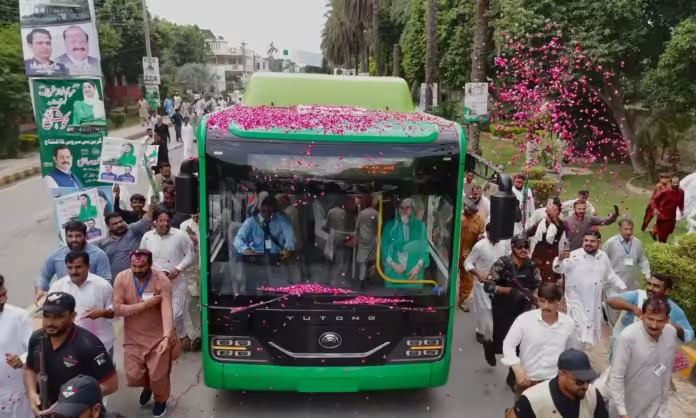A Blessing for Sargodha Turns Bitter – Electric Buses damaged within a week!
Some days back, Punjab Chief Minister Maryam Nawaz gave Sargodha a wonderful gift—new electric buses that promised to revolutionize public transport. The buses represented development, relief, and a greener tomorrow for the city. For many of the residents, it was not only a new way of traveling—it was a peak into what a better future could be.
But, alas, the joy was short-lived. Within a week, the same facility that was supposed to make life easier for the people was vandalized. Windows were broken, interiors destroyed, and scratches marred the bus bodies. The revelation of this destruction made hearts cry out, and an eerie question was in everyone’s minds: who is really responsible for this loss?
Not a Government Failure, But a Mindset Crisis
It is easy to blame the government for everything whenever public facilities fail. But in this instance, the buses had not been withdrawn, neither did they mechanically fail. They were burned by other people who were supposed to benefit from them.
This is not the failure of the government—it is ours. This is a failure of attitude, discipline, and collective responsibility. The electric buses were intended to be a public asset, but the absence of ownership and respect made them victims of carelessness.
Why Do We Destroy What’s Ours?
The vandalism tragedy in Sargodha is not recent; it is proof of a larger societal trend. Parks, hospitals, schools, and transport facilities all over Pakistan are often subjected to the same treatment—torn and abandoned by society.
- Lack of civic sense: Most still fail to realize that public amenities are their own.
- Carelessness and frustration: A culture of impatience normally expresses itself in ways that bring destruction.
- Ineffective enforcement: With minimal fear of repercussions, most feel they can wreck property without repercussions.
The attitude problem goes deeper than busted buses—it is about the lack of ownership of our own country’s assets.
Electric Buses: A Step Toward a Cleaner Future
Remember what these buses symbolized. These were not merely buses; they were an answer to increasing transport issues, fuel prices, and environmental issues. With the introduction of electric buses, the government wanted to:
- Minimize urban pollution.
- Offer secure, cheap, and efficient transportation.
- Develop modern commuting systems for cities.
Rather than welcoming this scheme, vandalizing these buses sent Sargodha back by using public funds wastefully and deterring future ventures.
Responsibility Is Ours
If there’s one thing to learn from this incident, it’s that responsibility is ours. The government can offer facilities, but it cannot babysit every bus, park, or hospital bed. Securing and guarding public property needs to become a collective responsibility.
Until we learn to honor what is provided to us, no amount of development schemes will ever succeed. If we fail to maintain electric buses now, how are we going to cope with metro trains, new hospitals, or smart city schemes in the future?
The Sargodha electric bus incident should be a wake-up call. We require campaigns to give people civic sense, tougher action against vandals, and most importantly, a change of heart. Public property is not “government property”—it is our property.
Maryam Nawaz’s project was a boon intended to simplify lives and illuminate futures. It’s time we, the citizens, start appreciating such largesse rather than dismantling them. Only then will development be sustainable, and only then will our cities develop for real.
Follow Pakistan Updates for more news and updates




